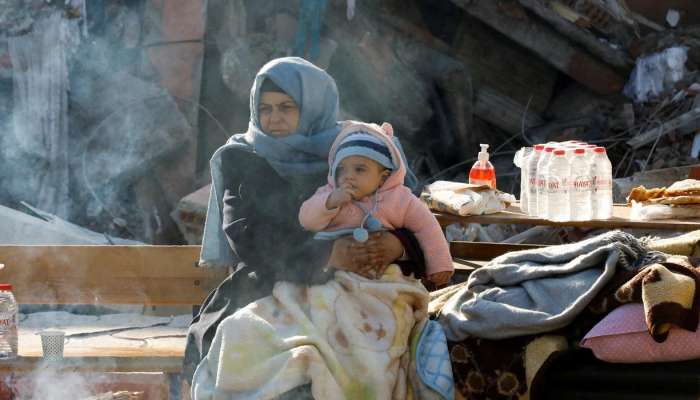
Ankara: The World Health Organization (WHO) on Tuesday said the deadly earthquakes in Türkiye and Syria, were the worst natural disaster in the region in a hundred years.
"We are witnessing the worst natural disaster in the WHO European Region for a century. We are still learning about its magnitude. Its true cost is not known yet," WHO regional director for Europe, Hans Kluge said at a press conference.
The comments come as the hopes of finding more survivors from the earthquakes, which struck over a week ago, fade.
Türkiye is among the 53 countries listed in the WHO's European Region, while neighboring Syria is in the Eastern Mediterranean region.
Turkish President Recep Tayyip Erdogan said the number of dead in his country had risen to 35,418.
Volunteer rescue group Syria Civil Defence — also known has The White Helmets — said the death toll had reached 2,166 in opposition-held areas, while the Syrian Health Ministry in Damascus said 1,414 people have died in government-held areas.
The latest figures bring the total number killed in the disaster to at least 39,000.
Erdogan compares earthquakes to atomic bombs
Turkish President Recep Tayyip Erdogan said last week's powerful earthquakes were "as big as atomic bombs" and killed 35,418 people in the country's southern region, according to remarks reported by state news agency Anadolu.
This means at least 39,000 people have been killed in Türkiye and Syria. According to United Nations estimates, the number could rise to 50,000 or more.
Erdogan also said hundreds of thousands of buildings in southern Türkiye were uninhabitable and more than 2.2 million people had fled the areas hit by the quakes.
Aid workers are still struggling to reach some collapsed buildings in Antakya, DW's Julia Hahn reported from the city in southern Türkiye, which was once home to more than 400,000 people.
"The destruction caused by the quakes here in Antakya is massive. It's unimaginable. When we drove into town earlier today, we saw hardly any buildings still standing. 70% of Antakya — that are the estimates — are gone," Hahn said.
Search and rescue teams from Türkiye but also from abroad — including teams from Mexico and Australia — are walking the streets, are trying to hear voices or noises from under the piles of rubble, the DW correspondent reported.
A team from the Istanbul Fire Department told Hahn that they aren't going to give up looking for survivors, no matter how small and slim the chances now are of still finding people alive.
The problem, however, is that many minor roads are still inaccessible, leaving search and rescue teams unable to even reach many of the collapsed buildings, Hahn added.
Rescuers pull nine survivors from ruins eight days after earthquake
At least nine survivors were rescued on Tuesday from the rubble of earthquake-hit areas of Türkiye, local media reported, eight days after worst quake in the country's modern history.
A 65-year-old Syrian man and a young girl were rescued from the rubble of a building in the southern Turkish city of Antakya, 208 hours after a devastating earthquake struck the region, Reuters television showed.
Earlier, a woman was pulled out from ruins of a building in the southern Turkish province of Hatay by Ukrainian rescue workers, some 205 hours after the devastating quake, broadcaster CNN Turk reported.
A 18-year-old man was rescued from the rubble of a building in southern Türkiye some 198 hours after the earthquake, CNN Turk said.
A short while earlier, rescue workers pulled two brothers alive from the ruins of an apartment block in neighbouring Kahramanmaras province. Three other women, two in Hatay province and one in Kahramanmaras city, were also rescued on Tuesday, Turkish media reported.
The AFP news agency reported that the first UN delegation to visit rebel-held northwestern Syria since last week's earthquake, crossed over from Türkiye.
"A multi-agency mission has gone this morning from the Türkiye side across the border crossing... It's largely an assessment mission," the World Food Programme's Syria director, Kenn Crossley, told AFP in Geneva.
On Monday, UN Secretary-General Antonio Guterres welcomed Syrian President Bashar Assad's decision to open two further crossings on the border with Türkiye, allowing more aid into the region following the deadly earthquakes in the region.
The UN, meanwhile, has been under pressure to act over the slow pace of aid to the quake-stricken region.
UN children's agency UNICEF said that more than 7 million children have been affected by the Türkiye-Syria earthquake and expressed fear over the thousands who have died.
"In Türkiye, the total number of children living in the 10 provinces hit by the two earthquakes was 4.6 million children. In Syria, 2.5 million children are affected," UNICEF spokesperson James Elder told reporters in Geneva.
"UNICEF fears many thousands of children have been killed," Elder said, warning that "even without verified numbers, it is tragically clear that numbers will continue grow."
Given the rising death toll, Elder said it was clear that "many, many children will have lost parents in these devastating earthquakes."
"It will be a terrifying figure," he added.
UN Secretary-General Antonio Guterres said that Syrian President Bashar Assad had agreed to allow UN aid deliveries to opposition-held northwest Syria through two additional border crossings from Türkiye for three months.
Türkiye's presidential office said the earthquakes has left 1.2 million people in southern Türkiye homeless.
The German government said it wants to temporarily ease visa restrictions for survivors of the earthquake in Türkiye and Syria. The easing of rules would apply to those who have close family ties to Germany if they are facing homelessness or were injured.